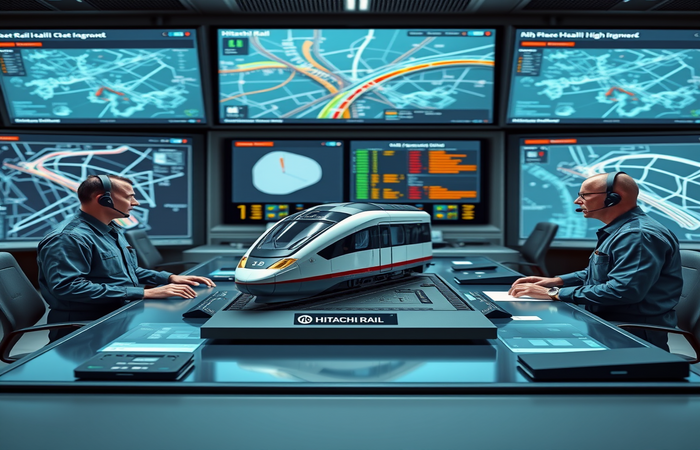Hitachi Rail to Modernize Hamburg-Berlin Rail Line CCS
Hitachi Rail is upgrading the Hamburg-Berlin high-speed rail line’s control-command and signaling system, enhancing efficiency and capacity.

Hitachi Rail Awarded Contract for CCS Renewal on Hamburg-Berlin Rail Line
Germany, October 26, 2023 – In a significant move to modernize its rail infrastructure, DB InfraGO (Deutsche Bahn’s infrastructure division) has awarded Hitachi Rail a contract for the comprehensive renewal of the control-command and signaling (CCS) system along a 200 km section of the Hamburg–Berlin high-speed rail line. This strategic project aims to enhance the efficiency, safety, and capacity of one of Germany’s busiest and most vital rail corridors. The modernization effort is a crucial component of Deutsche Bahn’s broader initiative to upgrade key high-performance corridors, supporting the decarbonization of transport and aligning with the Trans-European Transport Network (TEN-T) goals for European rail integration. The project encompasses a wide array of technological upgrades, from interlocking systems to trackside equipment and train protection systems, ensuring the continued operation of high-speed services between Hamburg and Berlin while maintaining a travel time of approximately 90 minutes. This undertaking marks a pivotal step in strengthening Germany’s railway network and contributes to the expansion of a cohesive European high-speed rail infrastructure.
Technological Scope of the Project
The core of the modernization project lies in the deployment of Hitachi Rail’s advanced CCS solution, built upon the ESTW L90 electronic interlocking system. This system is characterized by its modern hardware platform and offers a future-proof approach to railway control. The contract’s scope is extensive, encompassing the renewal of all electronic interlocking subcenters, which are critical for managing train movements and ensuring safety. It also involves the upgrade of trackside equipment, including the control and train protection system, power supply infrastructure, indoor equipment, and axle counting systems. Furthermore, the project will include minor track layout adjustments, strategically designed to optimize operational efficiency. Two new crossovers will be established in Zernitz and Vietznitz, facilitating greater flexibility and operational capacity on the line. Finally, the project includes a complete renewal of the continuous automatic train control system (LZB), which is crucial for maintaining maximum train speeds of up to 230 km/h. This comprehensive approach ensures the long-term reliability and performance of the Hamburg-Berlin rail line, supporting the efficient movement of passengers.
Enhancing Operational Efficiency and Capacity
Beyond the technological upgrades, this project aims to deliver substantial improvements in operational efficiency and network capacity. The strategic adjustments to the track layout, along with the addition of two new crossovers, are specifically designed to streamline train movements and reduce potential bottlenecks. Crossovers provide the ability to switch trains from one track to another, which is essential for managing disruptions, facilitating maintenance, and optimizing train flow. The upgrades to the LZB system, which ensures continuous train control, further enhance operational safety and allows for the continuation of high-speed operations. The project’s focus on maximizing efficiency directly contributes to the overall capacity of the Hamburg-Berlin rail line, allowing for more frequent and reliable train services. This is a fundamental step in Deutsche Bahn’s strategy to make rail transport a more attractive and competitive alternative to other modes of transport, particularly for long-distance travel between major cities.
Project Timeline and Integration within Broader Initiatives
The final contracts for the Hamburg-Berlin rail line modernization were awarded in May 2023, with the main construction works scheduled to commence in August. The project is expected to take approximately nine months to complete, with an estimated completion date in the spring of 2026. This timeline reflects the complexity of the undertaking, which requires meticulous planning and execution to minimize disruption to existing rail services. The Hamburg-Berlin project is closely aligned with Deutsche Bahn’s broader infrastructure overhaul of selected high-performance corridors. This initiative forms a central pillar of Germany’s strategy to implement the decarbonization of transport and to significantly increase capacity on the rail network. Furthermore, the project is an integral part of the Trans-European Transport Network (TEN-T), which aims to facilitate the integration of European rail transport, fostering connectivity and promoting sustainable mobility across the continent. This dual focus on national infrastructure enhancement and European integration underscores the strategic importance of the Hamburg-Berlin project.
Conclusion
The contract awarded to Hitachi Rail for the CCS renewal on the Hamburg-Berlin rail line marks a significant advancement in Germany’s commitment to modernizing its railway infrastructure. This project is not merely a technological upgrade but a strategic investment in the future of rail transport, aiming to enhance operational efficiency, increase network capacity, and promote sustainable mobility. The comprehensive scope of the project, encompassing the renewal of interlocking systems, trackside equipment, and train protection systems, underscores the commitment to improving the safety, reliability, and speed of rail services along this vital high-speed corridor. The planned adjustments to track layouts and the implementation of new crossovers are designed to optimize train flow and minimize potential disruptions, contributing to a more seamless travel experience for passengers. The commitment to maintaining a 90-minute travel time between Hamburg and Berlin is crucial in maintaining the attractiveness of rail travel in the long-distance passenger transport market. Moreover, the alignment of this project with the broader goals of Deutsche Bahn’s infrastructure overhaul and the Trans-European Transport Network further solidifies its importance. The project’s completion in 2026 will be a milestone in the ongoing effort to decarbonize transport and integrate European rail networks. Ultimately, this project exemplifies a proactive approach to strengthening Germany’s railway system, reinforcing its role in both the national and international transport landscape.
“`
Short Summary of Companies
DB InfraGO: The infrastructure division of Deutsche Bahn, responsible for the maintenance, expansion, and operation of the German rail network. They are the contracting entity for this project.
Hitachi Rail: A global provider of rail solutions, including signaling systems, rolling stock, and maintenance services. They are the primary contractor for the CCS renewal project on the Hamburg-Berlin line.
“`




